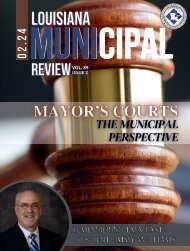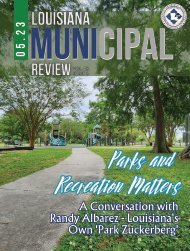December 2023
Create successful ePaper yourself
Turn your PDF publications into a flip-book with our unique Google optimized e-Paper software.
RISK MANAGEMENT, INC.<br />
MPERS Litigation – Analysis of MPERS’ Frequently Asked Questions<br />
In the November edition of the Louisiana<br />
Municipal Review, we provided you with<br />
FAQs regarding the Municipal Police Employees’<br />
Retirement System (MPERS), and<br />
their initiated litigation against several Louisiana<br />
municipalities across the state. This<br />
litigation alleges noncompliance with their<br />
protocols for signing up certain municipal<br />
law enforcement employees into their retirement system.<br />
The decision not to settle any claim (or suit) by MPERS against<br />
your municipality has been, is, and will be, the municipality’s<br />
decision. Your municipality is free to agree with the terms of<br />
the “amended resolution” and any “settlement agreement” at<br />
any time. The attorneys retained by RMI to provide defense,<br />
and guidance, to our LMRMA participant municipalities have<br />
never indicated otherwise.<br />
The legal and financial exposures brought about by the<br />
MPERS litigation are so potentially severe to all possible targeted<br />
Louisiana municipalities, that we also provided a copy<br />
of MPERS’s FAQs through our comprehensive email delivery<br />
system. Since publication, our team of defense attorneys has<br />
analyzed the discussed FAQs, and the following are the results<br />
of this review.<br />
Is membership in MPERS mandatory?<br />
Yes, membership in MPERS is mandatory pursuant to RS.<br />
11:2214 if the conditions therein are met.<br />
Can an officer required to be a member of MPERS opt out?<br />
Yes, under certain circumstances, set forth in R.S. 11:157, the<br />
officer can elect to not become a member of MPERS only if:<br />
1) The municipality covers its employees with social security;<br />
and<br />
2) The municipality has not specifically excluded its employee<br />
police officers from MPERS, but<br />
3) The police employee must enroll in MPERS, and his/her<br />
membership remains in effect until the appropriate affidavit is<br />
prepared and filed by the employee under RS 11:157(c).<br />
But what if the municipality is paying social security on its<br />
chief?<br />
A chief of police, who meets the definition of “employee” pursuant<br />
to R.S. 11:2213(11) must be enrolled in MPERS (unless<br />
the requisite conditions of RS.11:157 have been met), even if<br />
the municipality is paying social security.<br />
Can a municipality force an elected chief to enroll in MPERS<br />
if he/she does not want to?<br />
Probably not. An elected chief of police is a municipal officer,<br />
but not an employee. At least one Attorney General Opinion<br />
indicates that a municipality does not<br />
have the authority to even investigate an<br />
elected chief. The Supreme Court has held<br />
no municipality may revoke any inherent<br />
power of an elected marshal (or chief).<br />
At least one Court of Appeals has held<br />
an elected chief has a cause of action to<br />
sue when a mayor tries to dismiss police<br />
personnel, even though they may be municipal employees.<br />
If a mayor cannot dismiss employees of a department of an<br />
elected chief, it is difficult to envision how the municipality<br />
can force an elected chief to sign documents, if the elected<br />
chief refuses.<br />
MPERS claims on their FAQ page that AG Opinions exist supporting<br />
their claim that they can reach back 10 years. Where<br />
are those opinions?<br />
Great question. We don’t know. We’ve asked for them through<br />
our attorneys, and thus far, MPERS has declined to produce<br />
them. However, we’ve looked too, and we can’t find them. Below<br />
is a QR Code to the results of a Westlaw search in the Attorney<br />
General Opinions database. 36 opinions in total appear,<br />
with all contained in the QR Code within this article. None support<br />
the claim that MPERS can “reach back for ten years.”<br />
What are retirement contributions<br />
considered under Louisiana law?<br />
Contributions to a retirement plan are<br />
a form of deferred compensation.<br />
If retirement contributions are “deferred<br />
compensation,” is the right to<br />
claim them subject to prescription?<br />
The Supreme Court and Courts of Appeal<br />
have held, multiple times, that a<br />
3-year prescription period applies to<br />
claims involving retirement plan contributions:<br />
(Please note that some<br />
operating systems may<br />
produce a pop up when accessing<br />
the QR Code. If your<br />
system does produce a pop<br />
up, simply click on “Block”<br />
to open the file.)<br />
“We reaffirm our previous statements that<br />
contributions to retirement plans are a form of deferred compensation.<br />
Consequently, we find that the plaintiff’s claim is one for compensation<br />
for services rendered. The applicable prescriptive period,<br />
then, is found in La. C.C. Art. 3494, which provides that an action for<br />
the recovery of compensation for services rendered is subject to a<br />
liberative prescription of three years.”<br />
The trial court found that the applicable prescriptive period<br />
is the ten-year period for personal actions. In Fishbein v.<br />
State ex rel. Louisiana State University Health Sciences Center,<br />
04-2482, p. 8 (La.4/12/05), 898 So.2d 1260, 126, the Supreme<br />
Court stated:<br />
Page 26<br />
LMR | DECEMBER <strong>2023</strong>
















